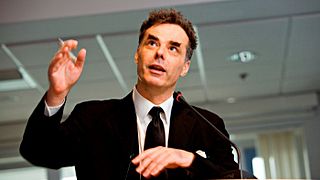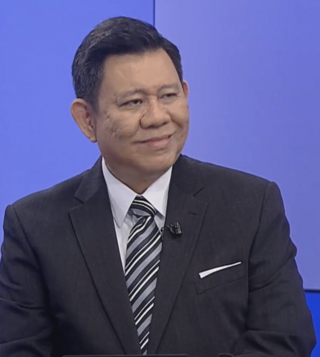This article has multiple issues. Please help improve it or discuss these issues on the talk page . (Learn how and when to remove these template messages)
|

Raffaele Marchetti (13 December 1975) is an Italian political scientist and editorialist.
This article has multiple issues. Please help improve it or discuss these issues on the talk page . (Learn how and when to remove these template messages)
|

Raffaele Marchetti (13 December 1975) is an Italian political scientist and editorialist.
He is deputy rector for internationalization and full professor at LUISS Guido Carli of Rome, where he teaches International Relations in the Department of Political Sciences and in the School of Government. In LUISS he held a Jean Monnet Module on European Union’s Engagement with Civil Society (2012-2015) and coordinates the preparatory course for the diplomatic concours and a course on strategic affairs. [1] He acts also as external evaluator for a number of public institutions and private companies at the national and international level on issues of civil society, peacebuilding, transnational networks, and governance
His research interests are about global politics, global governance, transnational civil society, democracy, [2] political risk, and city diplomacy.
He has produced one of the first MOOCs on IR: "From International Relations to Global Politics" for Iversity.
He is currently[ when? ] completing a monography on Dynamics Global Politics: Goals, Strategies, and Impact of Non-State Actors [2] and is working on a longer term project entitled Constructing Global Legitimacy. The Competition for World Order.
After having read Philosophy at the Sapienza University of Rome, he took a PhD in Government at the London School of Economics and Political Science, completing a thesis entitled "Cosmopolitanism restated. A choice-based consequentialist perspective on global democratic inclusion: The cases of migration and world federalism". [3] Later he had two post-docs as Jean Monnet Fellow at the European University Institute and as assegnista at LUISS Guido Carli. [2]
He was scientific coordinator of the project SHUR. Human Rights in Conflicts: The Role of Civil Society funded by the European Commission within the 6thFP. [2] He was visiting professor at China Foreign Affairs University-Beijing, Sciences Po-Paris, Strathmore University-Nairobi, Université de Geneve, and Waseda-Tokyo. He was fellow at the Italian National Research Council, research fellow within the Network of Excellence GARNET. Global Governance, Regionalisation & Regulation: The Role of the EU and in the project DEMOS. Democracy in Europe and the Mobilization of Society both funded by the European Commission, and contractor for the European Union Institute for Security Studies-EUISS of Paris and the Istituto San Pio V of Rome. [1]
He taught at the London School of Economics, American University of Rome, John Cabot University, MGIMO, Universitè de Genève and University of Naples Orientale. [1]
He carried out research at the University of Exeter, University of Nottingham, and University di Urbino. [1]
In 2005 he won the Lawrence S. Finkelstein Award from the International Studies Association-ISA, Section on International Organization. [1]
In 2010 he was rapporteur for the European Commission (DG Research) on Civil Society and Global Governance. [4] He is involved in the LUISS PhD programmes: the PhD in Political Theory and Political Science, and the Joint Doctorate Programme Globalization, Europe, and Multilateralism-GEM.
Monographs
Edited Books
Key articles and book chapters
Cosmopolitanism is the idea that all human beings are members of a single community. Its adherents are known as cosmopolitan or cosmopolite. Cosmopolitanism is both prescriptive and aspirational, believing humans can and should be "world citizens" in a "universal community". The idea encompasses different dimensions and avenues of community, such as promoting universal moral standards, establishing global political structures, or developing a platform for mutual cultural expression and tolerance.
Democratic globalization is a social movement towards an institutional system of global democracy. One of its proponents is the British political thinker David Held. In the last decade, Held published a dozen books regarding the spread of democracy from territorially defined nation states to a system of global governance that encapsulates the entire world. For some, democratic mundialisation is a variant of democratic globalisation stressing the need for the direct election of world leaders and members of global institutions by citizens worldwide; for others, it is just another name for democratic globalisation.

Saskia Sassen is a Dutch-American sociologist noted for her analyses of globalization and international human migration. She is a professor of sociology at Columbia University in New York City, and the London School of Economics. The term global city was coined and popularized by Sassen in her 1991 work, The Global City: New York, London, Tokyo.
David Jonathan Andrew Held was a British political scientist who specialised in political theory and international relations. He held a joint appointment as Professor of Politics and International Relations, and was Master of University College, at Durham University until his death. He was also a visiting Professor of Political Science at Libera Università Internazionale degli Studi Sociali Guido Carli. Previously he was the Graham Wallas chair of Political Science and the co-director of the Centre for the Study of Global Governance at the London School of Economics.
Multi-level governance is a term used to describe the way power is spread vertically between many levels of government and horizontally across multiple quasi-government and non-governmental organizations and actors. This situation develops because many countries have multiple levels of government including local, regional, state, national or federal, and many other organisations with interests in policy decisions and outcomes. International governance also operates based on multi-level governance principles. Multi-level governance can be distinguished from multi-level government which is when different levels of government share or transfer responsibility amongst each other. Whereas multi-level governance analyses the relationship of different state levels and interaction with different types of actors.'
Cosmopolitan democracy is a political theory which explores the application of norms and values of democracy at the transnational and global sphere. It argues that global governance of the people, by the people, for the people is possible and needed. Writers advocating cosmopolitan democracy include Immanuel Kant, David Held, Daniele Archibugi, Richard Falk, and Mary Kaldor. In the cosmopolitan democracy model, decisions are made by those affected, avoiding a single hierarchical form of authority. According to the nature of the issues at stake, democratic practice should be reinvented to take into account the will of stakeholders. This can be done either through direct participation or through elected representatives. The model advocated by cosmopolitan democrats is confederal and decentralized—global governance without world government—unlike those models of global governance supported by classic World Federalism thinkers, such as Albert Einstein.
Amrita Basu is an American academic and political scientist. She currently is a professor at Amherst College where she holds affiliations in the departments of Political Science, Sexuality, Women's, & Gender Studies, Asian Languages & Civilizations, and Black Studies.
Patrick Bond is Distinguished Professor at the University of Johannesburg Department of Sociology, where he directs the Centre for Social Change. From 2020-21 he was professor at the University of the Western Cape School of Government and from 2015-19, distinguished professor of political economy at the University of the Witwatersrand Wits School of Governance. Before that, from 2004, he was senior professor at the University of KwaZulu-Natal, where he directed the Centre for Civil Society. His research interests include political economy, environment, social policy, and geopolitics.
Donatella della Porta is an Italian sociologist and political scientist, who is Professor of political science and political sociology at the Scuola Normale Superiore. She is known for her research in the areas of social movements, corruption, political violence, police and policies of public order. In 2022, she was named a fellow of the American Academy of Arts and Sciences.

Daniele Archibugi is an Italian economic and political theorist. He works on the economics and policy of innovation and technological change, on the political theory of international relations and on political and technological globalisation.
Thomas Risse is a Berlin-based international relations scholar. He currently acts as chair for “transnational relations, foreign- and security policy” at the Otto-Suhr Institute for Political Science at Freie Universität Berlin. Furthermore, he has several engagements in German and international research networks, he also heads the PhD program of the Hertie School of Governance in Berlin.
The transnational capitalist class (TCC), also known as the transnational capitalist network (TCN), in neo-Gramscian and Marxian-influenced analyses of international political economy and globalization, is the global social stratum that controls supranational instruments of the global economy such as transnational corporations and heavily influences political organs such as the World Trade Organization.
John S. Dryzek is a Centenary Professor at the Centre for Deliberative Democracy and Global Governance at the University of Canberra's Institute for Governance and Policy Analysis.

Mary Henrietta Kaldor is a British academic, currently Professor of Global Governance at the London School of Economics, where she is also the Director of the Civil Society and Human Security Research Unit. She also teaches at the Institut Barcelona d'Estudis Internacionals (IBEI). She has been a key figure in the development of cosmopolitan democracy. She writes on globalisation, international relations and humanitarian intervention, global civil society and global governance, as well as what she calls New Wars.
The Luiss School of Government - LuissSoG - is a graduate school of the LUISS Guido Carli University - Libera Università Internazionale degli Studi Sociali Guido Carli, a private university affiliated with Confindustria and based in the Italian capital Rome.
Sergio Fabbrini is an Italian political scientist. He is Head of the Department of Political Science and Professor of Political science and International relations at Libera Università Internazionale degli Studi Sociali Guido Carli in Rome, where he holds the Intesa Sanpaolo Chair on European Governance. He had also the Pierre Keller Visiting Professorship Chair at the Harvard University, Kennedy School of Government (2019/2020). He is the co-founder and former Director of the LUISS School of Government He is also recurrent professor of Comparative Politics at the Institute of Governmental Studies at the University of California at Berkeley.

Julio Cabral Teehankee is a Filipino political scientist. He is Full Professor of Political Science and International Studies at De La Salle University (DLSU) where he served as Chair of the Political Science Department (1994–2007); Chair of the International Studies Department (2008–2013); and Dean of the College of Liberal Arts (2013–2017).

Patrizia Nanz is a political scientist and an expert in public participation and democratic innovations. She has provided expertise to businesses, state agencies, and governments in various European countries.
Carol C. Gould is an American philosopher and feminist theorist. Since 2009, she has taught at City University of New York, where she is currently Distinguished Professor of Philosophy at Hunter College, and in the Doctoral Programs of Philosophy and Political Science at the CUNY Graduate Center, where she is Director of the Center for Global Ethics and Politics at the Ralph Bunche Institute. Gould is also editor-in-chief of the Journal of Social Philosophy. Her 2004 book Globalizing Democracy and Human Rights received the 2009 David Easton Award which is given by the American Political Science Association "for a book that broadens the horizons of contemporary political science." Her 2014 book Interactive Democracy: The Social Roots of Global Justice received the 2015 Joseph B. Gittler Award from the American Philosophical Association for "an outstanding scholarly contribution in the field of the philosophy of one or more of the social sciences."
World federalism or global federalism is a political ideology advocating a democratic, federal world government. A world federation would have authority on issues of global reach, while the members of such a federation would retain authority over local and national issues. The overall sovereignty over the world population would largely reside in the federal government.